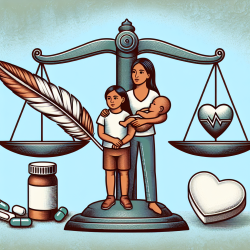Introduction
In the pursuit of enhancing mental health outcomes for children and adolescents, understanding the cultural narratives and social contexts that shape behaviors is crucial. The research article "Gendered Antecedents and Consequences of Young Women’s Suicidal Acts in Sri Lanka" offers invaluable insights into the circumstances surrounding suicidal acts among young women in rural Sri Lanka. This blog aims to guide practitioners in leveraging these insights to improve their practice and encourage further research in this area.
Understanding the Context
The study conducted in Sri Lanka reveals that many suicidal acts among young women are not driven by a desire to die but are instead responses to acute family conflicts, often related to accusations of sexual misconduct. These acts are deeply embedded in the cultural norms of femininity and the societal expectations of women in Sri Lanka.
The concept of læjja-baya, or "shame-fear," plays a significant role in shaping young women's behavior. It prescribes emotional restraint and modesty, which are crucial for maintaining a girl's respectability and, by extension, her family's honor. The study highlights how these cultural norms can lead to suicidal acts when young women feel their respectability is threatened.
Key Findings
- Suicidal acts are often unpremeditated and occur in response to family conflicts, particularly those involving accusations of sexual impropriety.
- Young women use suicidal acts as a means to force changes in others' behavior, such as curbing a father's excessive drinking.
- Families often respond with anger and punishment rather than understanding or support, viewing these acts as foolish or disobedient.
- Public knowledge of a girl's suicidal act can severely damage her reputation and her family's social standing, leading to efforts to conceal such acts.
Implications for Practitioners
Practitioners working with young women in similar cultural contexts should consider the following strategies:
- Adopt a culturally sensitive approach that acknowledges the societal and familial pressures young women face.
- Focus on relational and structural interventions rather than individual pathology, understanding that these acts are often strategic responses to social constraints.
- Engage families in dialogue to shift perceptions from viewing suicidal acts as shameful to understanding them as cries for help.
- Advocate for increased mental health resources and culturally appropriate support systems in rural areas.
Encouraging Further Research
While this study provides critical insights, further research is needed to explore the broader implications of cultural narratives on mental health and to develop effective interventions. Practitioners are encouraged to collaborate with researchers to deepen the understanding of these issues and to contribute to the development of culturally informed mental health practices.
To read the original research paper, please follow this link: Gendered Antecedents and Consequences of Young Women’s Suicidal Acts in Sri Lanka.










